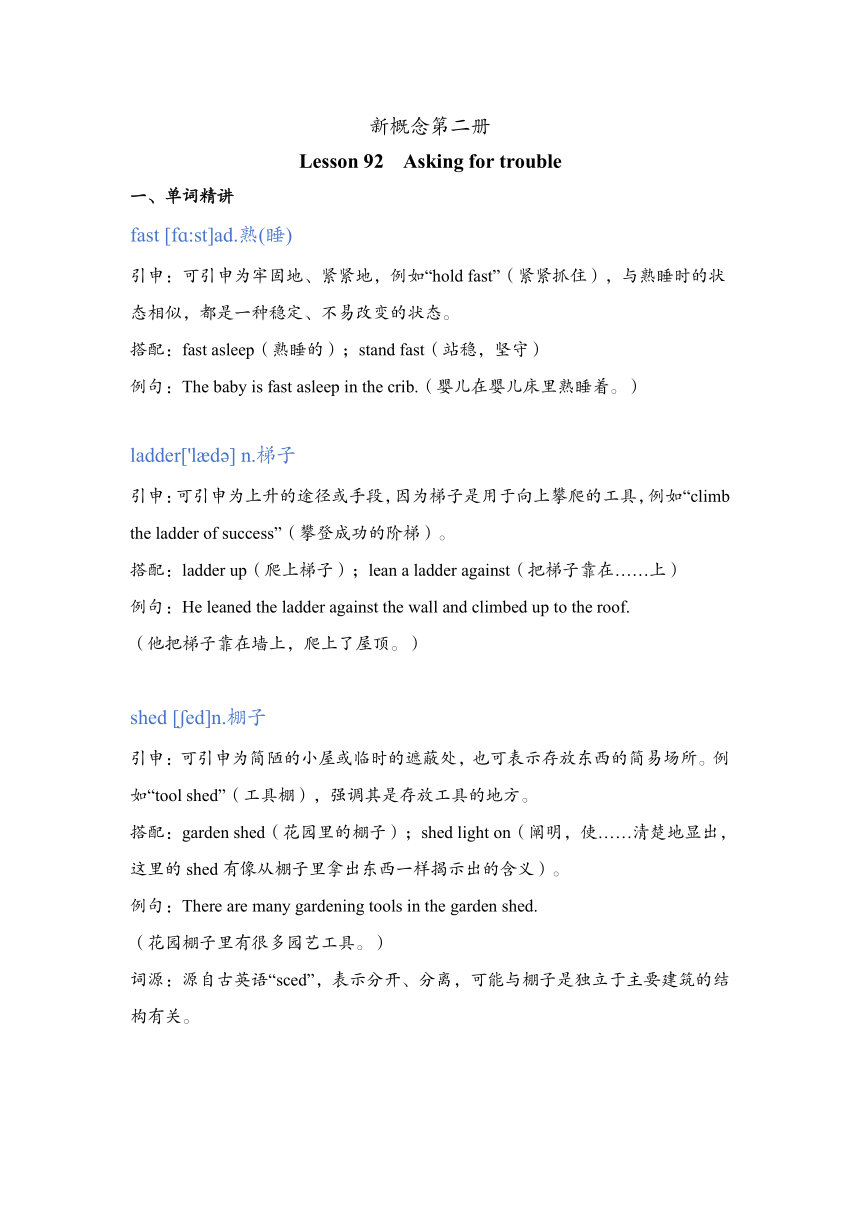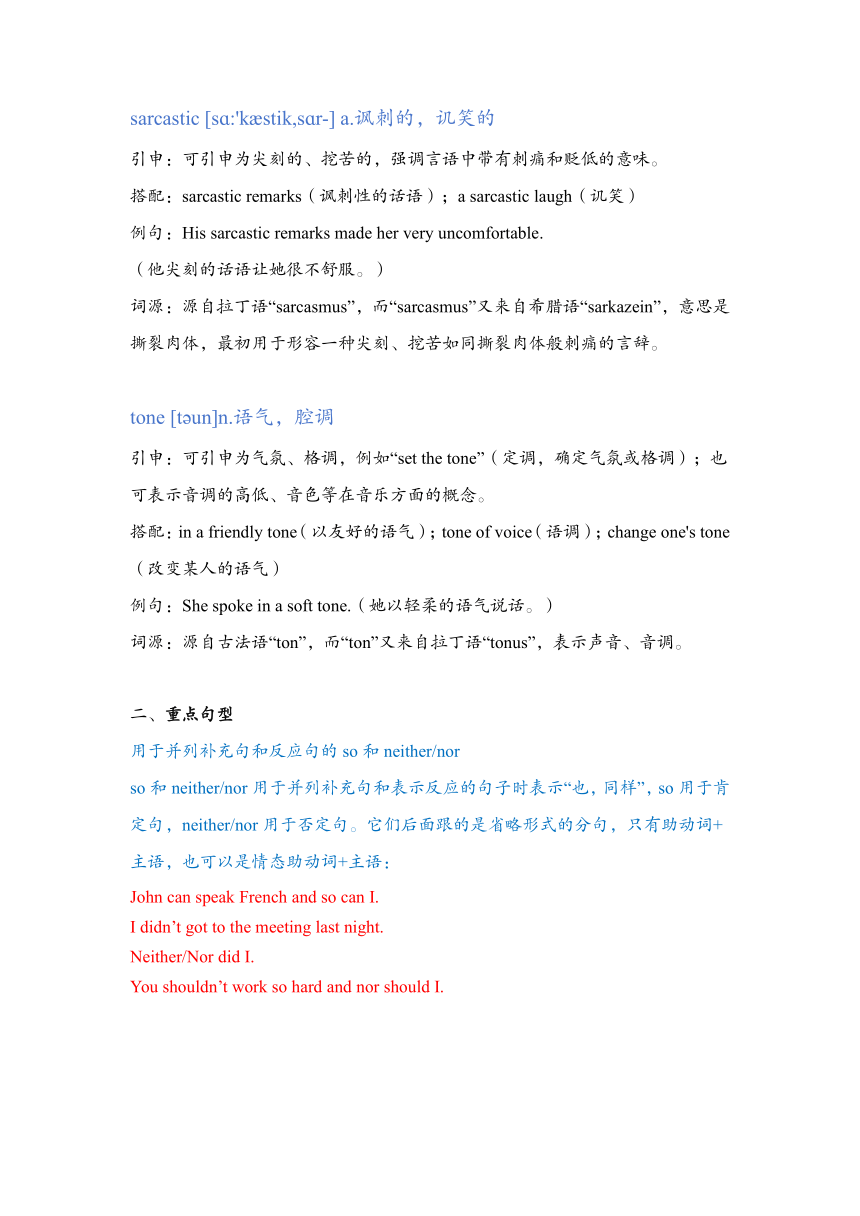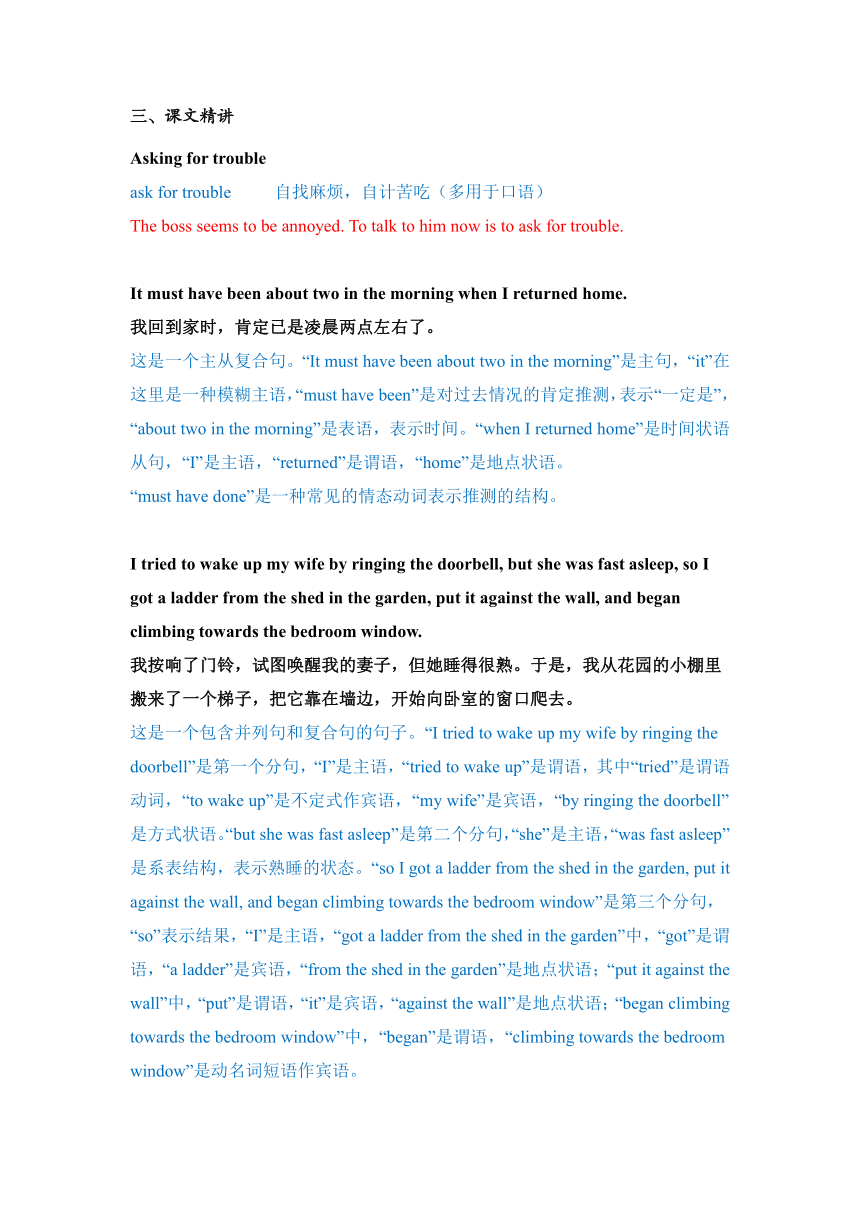新概念第二册Lesson 92 Asking for trouble讲义
文档属性
| 名称 | 新概念第二册Lesson 92 Asking for trouble讲义 |  | |
| 格式 | docx | ||
| 文件大小 | 95.2KB | ||
| 资源类型 | 教案 | ||
| 版本资源 | 新概念英语 | ||
| 科目 | 英语 | ||
| 更新时间 | 2024-11-25 21:29:05 | ||
图片预览



文档简介
新概念第二册
Lesson 92 Asking for trouble
单词精讲
fast [fɑ:st]ad.熟(睡)
引申:可引申为牢固地、紧紧地,例如“hold fast”(紧紧抓住),与熟睡时的状态相似,都是一种稳定、不易改变的状态。
搭配:fast asleep(熟睡的);stand fast(站稳,坚守)
例句:The baby is fast asleep in the crib.(婴儿在婴儿床里熟睡着。)
ladder['l d ] n.梯子
引申:可引申为上升的途径或手段,因为梯子是用于向上攀爬的工具,例如“climb the ladder of success”(攀登成功的阶梯)。
搭配:ladder up(爬上梯子);lean a ladder against(把梯子靠在……上)
例句:He leaned the ladder against the wall and climbed up to the roof.
(他把梯子靠在墙上,爬上了屋顶。)
shed [ ed]n.棚子
引申:可引申为简陋的小屋或临时的遮蔽处,也可表示存放东西的简易场所。例如“tool shed”(工具棚),强调其是存放工具的地方。
搭配:garden shed(花园里的棚子);shed light on(阐明,使……清楚地显出,这里的shed有像从棚子里拿出东西一样揭示出的含义)。
例句:There are many gardening tools in the garden shed.
(花园棚子里有很多园艺工具。)
词源:源自古英语“sced”,表示分开、分离,可能与棚子是独立于主要建筑的结构有关。
sarcastic [sɑ:'k stik,sɑr-] a.讽刺的,讥笑的
引申:可引申为尖刻的、挖苦的,强调言语中带有刺痛和贬低的意味。
搭配:sarcastic remarks(讽刺性的话语);a sarcastic laugh(讥笑)
例句:His sarcastic remarks made her very uncomfortable.
(他尖刻的话语让她很不舒服。)
词源:源自拉丁语“sarcasmus”,而“sarcasmus”又来自希腊语“sarkazein”,意思是撕裂肉体,最初用于形容一种尖刻、挖苦如同撕裂肉体般刺痛的言辞。
tone [t un]n.语气,腔调
引申:可引申为气氛、格调,例如“set the tone”(定调,确定气氛或格调);也可表示音调的高低、音色等在音乐方面的概念。
搭配:in a friendly tone(以友好的语气);tone of voice(语调);change one's tone(改变某人的语气)
例句:She spoke in a soft tone.(她以轻柔的语气说话。)
词源:源自古法语“ton”,而“ton”又来自拉丁语“tonus”,表示声音、音调。
重点句型
用于并列补充句和反应句的so和neither/nor
so和neither/nor用于并列补充句和表示反应的句子时表示“也,同样”,so用于肯定句,neither/nor用于否定句。它们后面跟的是省略形式的分句,只有助动词+主语,也可以是情态助动词+主语:
John can speak French and so can I.
I didn’t got to the meeting last night.
Neither/Nor did I.
You shouldn’t work so hard and nor should I.
课文精讲
Asking for trouble
ask for trouble 自找麻烦,自计苦吃(多用于口语)
The boss seems to be annoyed. To talk to him now is to ask for trouble.
It must have been about two in the morning when I returned home.
我回到家时,肯定已是凌晨两点左右了。
这是一个主从复合句。“It must have been about two in the morning”是主句,“it”在这里是一种模糊主语,“must have been”是对过去情况的肯定推测,表示“一定是”,“about two in the morning”是表语,表示时间。“when I returned home”是时间状语从句,“I”是主语,“returned”是谓语,“home”是地点状语。
“must have done”是一种常见的情态动词表示推测的结构。
I tried to wake up my wife by ringing the doorbell, but she was fast asleep, so I got a ladder from the shed in the garden, put it against the wall, and began climbing towards the bedroom window.
我按响了门铃,试图唤醒我的妻子,但她睡得很熟。于是,我从花园的小棚里搬来了一个梯子,把它靠在墙边,开始向卧室的窗口爬去。
这是一个包含并列句和复合句的句子。“I tried to wake up my wife by ringing the doorbell”是第一个分句,“I”是主语,“tried to wake up”是谓语,其中“tried”是谓语动词,“to wake up”是不定式作宾语,“my wife”是宾语,“by ringing the doorbell”是方式状语。“but she was fast asleep”是第二个分句,“she”是主语,“was fast asleep”是系表结构,表示熟睡的状态。“so I got a ladder from the shed in the garden, put it against the wall, and began climbing towards the bedroom window”是第三个分句,“so”表示结果,“I”是主语,“got a ladder from the shed in the garden”中,“got”是谓语,“a ladder”是宾语,“from the shed in the garden”是地点状语;“put it against the wall”中,“put”是谓语,“it”是宾语,“against the wall”是地点状语;“began climbing towards the bedroom window”中,“began”是谓语,“climbing towards the bedroom window”是动名词短语作宾语。
“wake up”表示唤醒,“fast asleep”表示熟睡的。
I was almost there when a sarcastic voice below said, I don't think the windows need cleaning at this time of the night.
快要爬到窗口时,下面一个人用讽刺的口吻说:“我看不必在夜里这个时候擦窗子吧。
有些动词如think,believe,expect,suppose等后接表示否定意思的宾语从句时,通常在主句中使用否定形式,但译成汉语时否定意义仍在宾语从句中。
I don’t believe he is still in London.
need表示“需要”时,后面接动名词有被动的含义。
need cleaning = need to be cleaned
I looked down and nearly fell off the ladder when I saw a policeman.
我向下面看去。当我看清是一个警察时,差一点儿从梯子上掉下去。
这是一个包含并列句和主从复合句的句子。“I looked down and nearly fell off the ladder”是并列句,“I”是主语,“looked down”和“nearly fell off the ladder”是并列的谓语和宾语结构,其中“looked down”表示向下看,“nearly fell off the ladder”中,“nearly”是副词作状语,“fell off”是谓语,“the ladder”是宾语。“when I saw a policeman”是时间状语从句,“I”是主语,“saw”是谓语,“a policeman”是宾语。
“fall off”表示从……掉落。
I immediately regretted answering in the way I did, but I said, 'I enjoy cleaning windows at night.'
我回答了他的话,但马上又后悔不该那样说,我是这样说的:“我喜欢在夜里擦窗子。”
regret doing sth. 后悔做了……(对已发生的事情表示后悔)
I regretted saying it almost at once.
regret to do sth. 遗憾……(对现在要发生的事表示抱歉)
We regret to inform you that you needn’t come here next week.
remember/forget +to do sth. 指末来的动作
I remembered to post the letters. 我记着去邮信了。(没有忘记)
I forgot to ask Tom. 我忘了去问汤姆。
remember/forget doing sth. 指过去的动作(已发生过)
I remember posting/having posted the letters.
Have you forgotten meeting/having met her at a party
你忘记了曾在一次聚会上见过她吗?
stop to do sth. 指目的
On the way to the station I stopped to buy a paper.
stop doing sth. 停下正在做的动作 When he told us the story, we just couldn’t stop laughing.
'So do I,' answered the policeman in the same tone. 'Excuse my interrupting you. I hate to interrupt a man when he's busy working, but would you mind coming with me to the station '
“我也是的,”警察用同样的声调回答,“请原谅我打断了您。当一个人在忙着干活时,我是不愿意去打断他的,但请您跟我到警察局去一趟好吗?”
这是一个包含多个句子的段落。“'So do I,' answered the policeman in the same tone.”中,“So do I”是一个倒装结构,表示“我也是”,“answered the policeman”是主谓结构,“in the same tone”是方式状语。“Excuse my interrupting you.”是一个祈使句,“my interrupting you”是动名词短语作宾语。“I hate to interrupt a man when he's busy working”是一个主从复合句,“I”是主语,“hate to interrupt”是谓语,“a man”是宾语,“when he's busy working”是时间状语从句。“but would you mind coming with me to the station ”是一个一般疑问句,“would you mind doing sth.”是一种常见结构,表示“你介意做某事吗”,“coming with me to the station”是动名词短语作宾语。
“in the same tone”表示以同样的语气,“mind doing sth.”表示介意做某事。
Well, I'd prefer to stay here,' I said. 'You see. I've forgotten my key.'
“可我更愿意呆在这儿,”我说,“您瞧,我忘带钥匙了。”
这是一个包含两个句子的段落。“'Well, I'd prefer to stay here,' I said.”中,“I'd prefer to stay here”是主句,“I”是主语,“'d prefer”是“would prefer”的缩写形式,“to stay here”是不定式作宾语,“I said”是主谓结构。“'You see. I've forgotten my key.'”是一个主从复合句,“I've forgotten my key”是主句,“I”是主语,“'ve forgotten”是“have forgotten”的缩写形式,是现在完成时,表示已经忘记,“my key”是宾语。
“prefer to do sth.”表示更喜欢做某事。
Your what ' he called.
“什么?”他大声问。
这是一个简单的省略句。“Your what ”是省略了完整句子(Your key )的表达,“he called”是主谓结构。
'My key,' I shouted.
“钥匙!”我喊道。
这是一个简单句。“My key”是宾语,“I shouted”是主谓结构。
Fortunately, the shouting woke up my wife who opened the window just as the policeman had started to climb towards me.
幸运得很,这喊声惊醒了我的妻子。就在警察开始向我爬上来时,她打开了窗子。
这是一个主从复合句。“Fortunately, the shouting woke up my wife”是主句,“Fortunately”是副词作状语,“the shouting”是主语,“woke up”是谓语,“my wife”是宾语。“who opened the window just as the policeman had started to climb towards me”是定语从句,“who”是关系代词,在从句中作主语,“opened”是谓语,“the window”是宾语,“just as the policeman had started to climb towards me”是时间状语从句,“the policeman”是主语,“had started to climb towards me”是谓语,表示过去完成时,强调在某个过去动作之前已经开始的动作。
“wake up”表示叫醒。
Lesson 92 Asking for trouble
单词精讲
fast [fɑ:st]ad.熟(睡)
引申:可引申为牢固地、紧紧地,例如“hold fast”(紧紧抓住),与熟睡时的状态相似,都是一种稳定、不易改变的状态。
搭配:fast asleep(熟睡的);stand fast(站稳,坚守)
例句:The baby is fast asleep in the crib.(婴儿在婴儿床里熟睡着。)
ladder['l d ] n.梯子
引申:可引申为上升的途径或手段,因为梯子是用于向上攀爬的工具,例如“climb the ladder of success”(攀登成功的阶梯)。
搭配:ladder up(爬上梯子);lean a ladder against(把梯子靠在……上)
例句:He leaned the ladder against the wall and climbed up to the roof.
(他把梯子靠在墙上,爬上了屋顶。)
shed [ ed]n.棚子
引申:可引申为简陋的小屋或临时的遮蔽处,也可表示存放东西的简易场所。例如“tool shed”(工具棚),强调其是存放工具的地方。
搭配:garden shed(花园里的棚子);shed light on(阐明,使……清楚地显出,这里的shed有像从棚子里拿出东西一样揭示出的含义)。
例句:There are many gardening tools in the garden shed.
(花园棚子里有很多园艺工具。)
词源:源自古英语“sced”,表示分开、分离,可能与棚子是独立于主要建筑的结构有关。
sarcastic [sɑ:'k stik,sɑr-] a.讽刺的,讥笑的
引申:可引申为尖刻的、挖苦的,强调言语中带有刺痛和贬低的意味。
搭配:sarcastic remarks(讽刺性的话语);a sarcastic laugh(讥笑)
例句:His sarcastic remarks made her very uncomfortable.
(他尖刻的话语让她很不舒服。)
词源:源自拉丁语“sarcasmus”,而“sarcasmus”又来自希腊语“sarkazein”,意思是撕裂肉体,最初用于形容一种尖刻、挖苦如同撕裂肉体般刺痛的言辞。
tone [t un]n.语气,腔调
引申:可引申为气氛、格调,例如“set the tone”(定调,确定气氛或格调);也可表示音调的高低、音色等在音乐方面的概念。
搭配:in a friendly tone(以友好的语气);tone of voice(语调);change one's tone(改变某人的语气)
例句:She spoke in a soft tone.(她以轻柔的语气说话。)
词源:源自古法语“ton”,而“ton”又来自拉丁语“tonus”,表示声音、音调。
重点句型
用于并列补充句和反应句的so和neither/nor
so和neither/nor用于并列补充句和表示反应的句子时表示“也,同样”,so用于肯定句,neither/nor用于否定句。它们后面跟的是省略形式的分句,只有助动词+主语,也可以是情态助动词+主语:
John can speak French and so can I.
I didn’t got to the meeting last night.
Neither/Nor did I.
You shouldn’t work so hard and nor should I.
课文精讲
Asking for trouble
ask for trouble 自找麻烦,自计苦吃(多用于口语)
The boss seems to be annoyed. To talk to him now is to ask for trouble.
It must have been about two in the morning when I returned home.
我回到家时,肯定已是凌晨两点左右了。
这是一个主从复合句。“It must have been about two in the morning”是主句,“it”在这里是一种模糊主语,“must have been”是对过去情况的肯定推测,表示“一定是”,“about two in the morning”是表语,表示时间。“when I returned home”是时间状语从句,“I”是主语,“returned”是谓语,“home”是地点状语。
“must have done”是一种常见的情态动词表示推测的结构。
I tried to wake up my wife by ringing the doorbell, but she was fast asleep, so I got a ladder from the shed in the garden, put it against the wall, and began climbing towards the bedroom window.
我按响了门铃,试图唤醒我的妻子,但她睡得很熟。于是,我从花园的小棚里搬来了一个梯子,把它靠在墙边,开始向卧室的窗口爬去。
这是一个包含并列句和复合句的句子。“I tried to wake up my wife by ringing the doorbell”是第一个分句,“I”是主语,“tried to wake up”是谓语,其中“tried”是谓语动词,“to wake up”是不定式作宾语,“my wife”是宾语,“by ringing the doorbell”是方式状语。“but she was fast asleep”是第二个分句,“she”是主语,“was fast asleep”是系表结构,表示熟睡的状态。“so I got a ladder from the shed in the garden, put it against the wall, and began climbing towards the bedroom window”是第三个分句,“so”表示结果,“I”是主语,“got a ladder from the shed in the garden”中,“got”是谓语,“a ladder”是宾语,“from the shed in the garden”是地点状语;“put it against the wall”中,“put”是谓语,“it”是宾语,“against the wall”是地点状语;“began climbing towards the bedroom window”中,“began”是谓语,“climbing towards the bedroom window”是动名词短语作宾语。
“wake up”表示唤醒,“fast asleep”表示熟睡的。
I was almost there when a sarcastic voice below said, I don't think the windows need cleaning at this time of the night.
快要爬到窗口时,下面一个人用讽刺的口吻说:“我看不必在夜里这个时候擦窗子吧。
有些动词如think,believe,expect,suppose等后接表示否定意思的宾语从句时,通常在主句中使用否定形式,但译成汉语时否定意义仍在宾语从句中。
I don’t believe he is still in London.
need表示“需要”时,后面接动名词有被动的含义。
need cleaning = need to be cleaned
I looked down and nearly fell off the ladder when I saw a policeman.
我向下面看去。当我看清是一个警察时,差一点儿从梯子上掉下去。
这是一个包含并列句和主从复合句的句子。“I looked down and nearly fell off the ladder”是并列句,“I”是主语,“looked down”和“nearly fell off the ladder”是并列的谓语和宾语结构,其中“looked down”表示向下看,“nearly fell off the ladder”中,“nearly”是副词作状语,“fell off”是谓语,“the ladder”是宾语。“when I saw a policeman”是时间状语从句,“I”是主语,“saw”是谓语,“a policeman”是宾语。
“fall off”表示从……掉落。
I immediately regretted answering in the way I did, but I said, 'I enjoy cleaning windows at night.'
我回答了他的话,但马上又后悔不该那样说,我是这样说的:“我喜欢在夜里擦窗子。”
regret doing sth. 后悔做了……(对已发生的事情表示后悔)
I regretted saying it almost at once.
regret to do sth. 遗憾……(对现在要发生的事表示抱歉)
We regret to inform you that you needn’t come here next week.
remember/forget +to do sth. 指末来的动作
I remembered to post the letters. 我记着去邮信了。(没有忘记)
I forgot to ask Tom. 我忘了去问汤姆。
remember/forget doing sth. 指过去的动作(已发生过)
I remember posting/having posted the letters.
Have you forgotten meeting/having met her at a party
你忘记了曾在一次聚会上见过她吗?
stop to do sth. 指目的
On the way to the station I stopped to buy a paper.
stop doing sth. 停下正在做的动作 When he told us the story, we just couldn’t stop laughing.
'So do I,' answered the policeman in the same tone. 'Excuse my interrupting you. I hate to interrupt a man when he's busy working, but would you mind coming with me to the station '
“我也是的,”警察用同样的声调回答,“请原谅我打断了您。当一个人在忙着干活时,我是不愿意去打断他的,但请您跟我到警察局去一趟好吗?”
这是一个包含多个句子的段落。“'So do I,' answered the policeman in the same tone.”中,“So do I”是一个倒装结构,表示“我也是”,“answered the policeman”是主谓结构,“in the same tone”是方式状语。“Excuse my interrupting you.”是一个祈使句,“my interrupting you”是动名词短语作宾语。“I hate to interrupt a man when he's busy working”是一个主从复合句,“I”是主语,“hate to interrupt”是谓语,“a man”是宾语,“when he's busy working”是时间状语从句。“but would you mind coming with me to the station ”是一个一般疑问句,“would you mind doing sth.”是一种常见结构,表示“你介意做某事吗”,“coming with me to the station”是动名词短语作宾语。
“in the same tone”表示以同样的语气,“mind doing sth.”表示介意做某事。
Well, I'd prefer to stay here,' I said. 'You see. I've forgotten my key.'
“可我更愿意呆在这儿,”我说,“您瞧,我忘带钥匙了。”
这是一个包含两个句子的段落。“'Well, I'd prefer to stay here,' I said.”中,“I'd prefer to stay here”是主句,“I”是主语,“'d prefer”是“would prefer”的缩写形式,“to stay here”是不定式作宾语,“I said”是主谓结构。“'You see. I've forgotten my key.'”是一个主从复合句,“I've forgotten my key”是主句,“I”是主语,“'ve forgotten”是“have forgotten”的缩写形式,是现在完成时,表示已经忘记,“my key”是宾语。
“prefer to do sth.”表示更喜欢做某事。
Your what ' he called.
“什么?”他大声问。
这是一个简单的省略句。“Your what ”是省略了完整句子(Your key )的表达,“he called”是主谓结构。
'My key,' I shouted.
“钥匙!”我喊道。
这是一个简单句。“My key”是宾语,“I shouted”是主谓结构。
Fortunately, the shouting woke up my wife who opened the window just as the policeman had started to climb towards me.
幸运得很,这喊声惊醒了我的妻子。就在警察开始向我爬上来时,她打开了窗子。
这是一个主从复合句。“Fortunately, the shouting woke up my wife”是主句,“Fortunately”是副词作状语,“the shouting”是主语,“woke up”是谓语,“my wife”是宾语。“who opened the window just as the policeman had started to climb towards me”是定语从句,“who”是关系代词,在从句中作主语,“opened”是谓语,“the window”是宾语,“just as the policeman had started to climb towards me”是时间状语从句,“the policeman”是主语,“had started to climb towards me”是谓语,表示过去完成时,强调在某个过去动作之前已经开始的动作。
“wake up”表示叫醒。
同课章节目录
